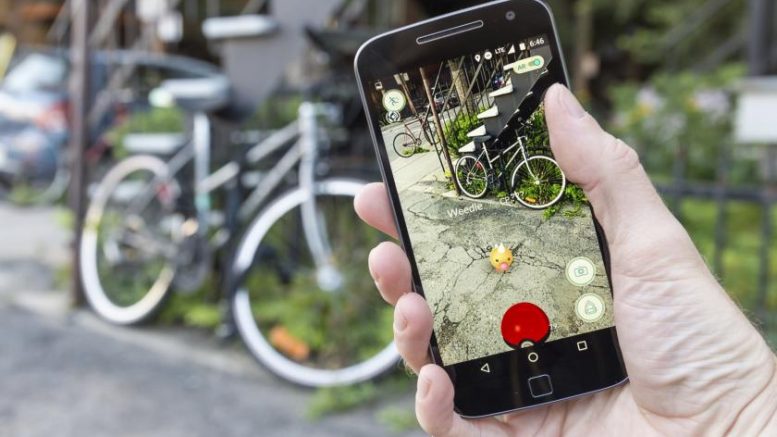Scott Dodich and Jayme Gotts-Dodich have a clear message for the Pokémon Go players who have invaded their local park and private cul-de-sac in St. Clair Shores, Michigan: Get off of their lawn! Also, don’t park in front of their driveway and those of their neighbors, and don’t trample their landscaping and look in their windows — and, when they ask you to leave their property, don’t yell, “Shut up b****, or else,” as one Pokémon Go fan did, according to a federal class action lawsuit the Dodiches filed against three companies that make, sell, or own Pokémon Go: Niantic, Nintendo, and Pokemon Co.
“Nobody gets sleep anymore,” says the lawsuit, filed Aug. 10 in U.S. District Court in San Francisco. Pokémon players “hang out on our lawns, trample landscaping, look in vehicles… We don’t feel safe… I don’t feel safe sitting on our porch.” This is Niantic’s fault, the Dodich suit claims, because the company places Pokéstops and Pokémon gyms (GPS coordinates where the virtual creatures appear) on or near private property with “a flagrant disregard for the foreseeable consequences of populating the real world with virtual Pokémon without seeking the permission of property owners.”
And Niantic knows this, the Dodiches say, pointing to a warning on the company website: “If you can’t get to the Pokéstop because it’s on private property, there will be more just around the corner, so don’t worry!” The couple says they contacted the company and its CEO several times before the lawsuit, receiving only form letters promising some response that, as of the lawsuit’s filing, hadn’t materialized. Niantic, Nintendo, and Pokémon did not respond when the Detroit Free Press reached out for comment on Monday.
The Dodiches asked for a jury trial, according to the lawsuit, which you can read at Detroit’s WDIV. That’s risky, given how many people love the virtual creature hunt. But if they get a jury of people who agree that it’s not okay for random people to trample through your private land, Niantic and its codefendants might be out some serious cash. The Dodich suit already pointed to some public cases of Pokéstops programmed in inappropriate or private locales, so the class might be large. Peter Weber
That’s where nanorobots come in.
That is about $61,204,000 spent by candidates hoping you’ll vote for them instead of Donald Trump. And Trump’s defense? Well, it’s pretty inexpensive: He has spent $0 on ads so far. Outside pro-Trump groups have spent a combined $12.4 million in advertising, compared to the $42 million spent by outside groups backing Clinton.
At this point, Trump has more or less surrendered the airwaves entirely to his competition. Clinton has dominated advertising in battleground states for two months with an almost 9-to-1 advantage in ad spending when outside groups are factored in, NBC News reports. And with Trump in what seems like a nearly irreversible slump, one can’t help but wonder if he hears the tick-tock of the clock counting down the minutes to Election Day.
Artificial black hole: Ultracold atoms in a tube undergo quantum fluctuations that produce pairs of virtual particles — in this case, packets of sound called phonons. If one phonon falls in the supersonic region, it is trapped, leading to a sonic form of Hawking radiation. [Nature]
The Federal Communications Commission is looking at two proposals to get rid of that cable set-top box you rent from your cable provider, at an average cost of $231 a year. That’s good news if you are a cable subscriber, though it’s a $20 billion loss in rental fees for the cable companies.
The two proposals the FCC is considering to replace the cable box are also very different, explains Seth Fiegerman at CNNMoney. In January, FCC Chairman Tom Wheeler proposed giving subscribers the option to scrap the set-top box, which you can only get from the cable company, for a cheaper third-party device that would also allow streaming Netflix, Hulu, or other online content services.
Cable companies hated this “Unlock the Box” proposal, which they blamed (probably unfairly) on Google, the tech giant that’s edging into the cable/broadband market and would presumably make one of those third-party devices, along with Apple, Amazon, and other tech companies. Comcast, AT&T, Dish, Time Warner Cable, and other cable interests formed a new lobbying group, the Future of TV Coalition, and went full-bore on Congress, aided by Hollywood studios, CNNMoney says. After the U.S. Copyright Office sided with the cable giants, the “Unlock the Box” proposal seems to be losing to “Ditch the Box,” an alternative favored by Big Cable that would replace set-top boxes with proprietary apps.
Big Tech isn’t a fan of “Ditch the Box,” and Wheeler dismissed the “one page” plan as an industry “press release.” You can learn more about how each proposal would work in the CNNMoney video below, but Wheeler is said to be angling to have a final proposal in place by the end of the year, so your set-top cable box’s days are probably numbered. And who knows? That might even save you $200 a year. Peter Weber
Hillary Clinton is beginning to prepare for the first general election debate against Donald Trump, scheduled for Sept. 26, and that means getting ready to confront some old hurts. Among the topics Clinton is expected to prepare to face is the death of Vincent Foster, the accusation she is a rape enabler, and the Monica Lewinsky and Gennifer Flowers scandals, Politico reports.
“You can’t put it beyond Trump that Monica Lewinsky will play a role in this debate. [Clinton’s] got to be prepared to deal with the Foundation and Wall Street and super PACs and all of that. They need to be less focused on dealing with [Trump’s] policy proposals and more on dealing with the unexpected. He’s going to be in attack mode, probably the whole time,” said Greg Craig, President Obama’s former White House counsel and an experienced debate-prepper.
The main issue at hand is predicting the unpredictable. Trump might be expected to go after Clinton for her use of a private email server, for example, but that is only if he stays on message. Clinton is also going to brace for being called “crooked,” or being told she “short-circuited,” but also for the insults maybe even Trump himself hasn’t come up with yet.
Of course, that means finding a close ally to play Trump in the debate prep — an uncomfortable role. “You have to start off by saying, ‘I want to thank the American people, especially Monica and Gennifer Flowers.’ Nobody who is a friend of hers is going to want to say that in debate prep,” a top Clinton ally told Politico. Jeva Lange
On Monday, large health insurer Aetna said that it is withdrawing from the ObamaCare exchange markets in two-thirds of the 778 counties where it was participating, keeping all its exchange offerings in just four states: Delaware, Virginia, Nebraska, and Iowa. Aetna CEO Mark Bertolini said that “as a strong supporter of public exchanges as a means to meet the needs of the uninsured, we regret having to make this decision,” but that its 838,000 exchange customers were sicker than anticipated, driving up costs and making the exchanges unprofitable. Other large insurers, including United Health and Humana, have also said they will scale back their involvement in the exchanges in 2017.
“It seems increasingly clear that big, national insurers are having trouble competing in the ObamaCare marketplaces and making money,” said Larry Levitt at the Kaiser Family Foundation. “Some insurers are still doing well, particularly those that historically served Medicaid beneficiaries.” Aetna said Monday that it has lost $430 million in its individual policy unit since January 2014, when the ObamaCare exchanges opened. Some 11 million Americans have insurance through the exchange marketplaces, and they are the only place where consumers can get federal subsidies, making them a key component of the Affordable Care Act.
Some allies of President Obama tied Aetna’s withdrawal to the Justice Department’s decision last month to block the company’s planned merger with Humana, plus Anthem’s acquisition of Cigna. As late as May, Aetna said it planned to expand its ObamaCare exchange options, Sen. Elizabeth Warren (D-Mass.) said on Facebook last week, after Aetna announced it was considering this withdrawal. “Aetna may not like the Justice Department’s decision to challenge its merger, and it has every right to fight that decision in court,” she said, but “the health of the American people should not be used as bargaining chips to force the government to bend to one giant company’s will.”
Several large insurers have complained about the program’s risk-adjustment apparatus. “I think the market will stabilize, and perhaps Aetna and United will come back,” Washington and Lee University law professor emeritus Timothy Jost tells CNNMoney. “But the market really needs support for another few years until it does, and since the majority in Congress is rooting for [the Affordable Care Act] to fail, it seems unlikely that the support will be forthcoming.” Peter Weber
Source: theweek.com




